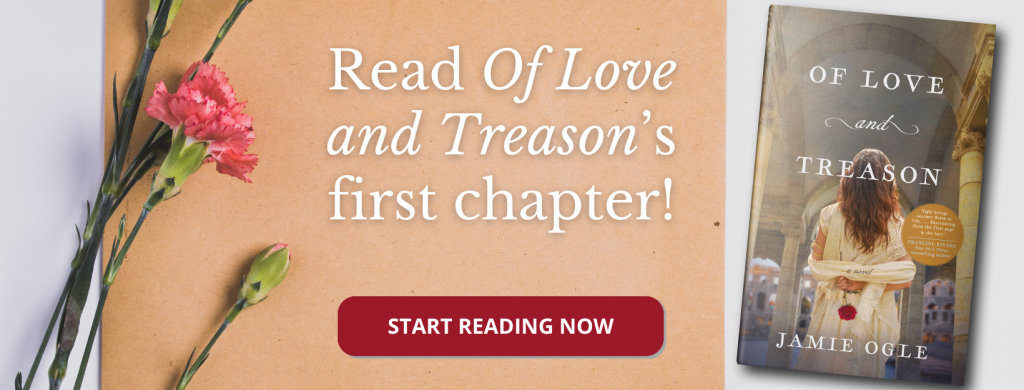Author Jamie Ogle’s debut historical fiction book Of Love and Treason retells the story of Saint Valentine, a man who defies the Roman emperor and becomes both a hero and the most wanted man in the empire. In this Q & A with Jamie, she talks about her inspiration for the novel, her approach to weaving historical details into a compelling narrative, and what she hopes readers will walk with after reading the book.
What inspired you to write this story?
I wish I had a better answer than to say I was irritated over Valentine’s Day and looked up the origins to see why we even celebrate it. I’m not sure what I expected to find, but it wasn’t to be completely swept up in a tale of rebellion, secret weddings, and courage. While my opinions on the commercial aspect of the holiday didn’t change, the story behind it captivated me. Then I stumbled across an artist’s rendition of a young Saint Valentine, which was strikingly different than the typical image of the wizened man I was used to seeing—and that shifted everything for me. The questions started tumbling. What if Valentine wasn’t an elderly man near the end of his life, with nothing to lose? What if he was young, with life and love ahead of him? What if he had to risk it all to follow his convictions?
What is true?
The original stories are a bit light on the details, which is a fiction writer’s dream. There were actually three Saint Valentines who led churches in Terni, Rome, and North Africa, all of whom died the same day. But it’s Valentine of Rome who is credited with performing weddings in secret when Emperor Claudius II allegedly banned marriages. When Valentine was eventually captured and imprisoned for his defiance of the ban, he fell in love with the jailor’s blind daughter. The stories vary on exactly how she was healed, but the endings are the same. Before he was executed, Valentine left behind a love letter to the jailor’s daughter signed, Love, your Valentine.

What was your approach to weaving together historical accuracy and storytelling?
After getting the briefest story outline from the legends, I was desperate for more. Unfortunately, the stories of Valentine first appear some two hundred years after his death. He left behind no surviving writings, and no contemporaries reference him. The historical record doesn’t even mention Claudius II’s unpopular marriage ban. So, I began puzzling the story together under the premise, If these stories are true, how could this have happened within the history and culture of third-century Rome? I researched Church history and the history and culture of the third-century Roman Empire, read surviving marriage contracts, visited Rome on a research trip, and fitted the pieces together into what would become, after many, many drafts, Of Love and Treason.
What did you learn while writing Of Love and Treason?
This story was a learning experience in so many areas of my life, from actual writing craft to my relationship with God. In the story, Iris, the jailor’s daughter, wrestles with how she can trust a God who can do miraculous things but doesn’t always keep his followers from danger. As I was writing the story, I found myself wrestling with those same questions, as I prayed for something, and God answered with a heartbreaking no.
As much as we want one, there isn’t an easy answer for why God allows suffering, why bad things happen to good people. It seems unjust. I read a lot of accounts of persecuted Christians from the Roman Empire up until today. They’re not easy stories to read, they’re not . . . comfortable. But they challenged me to consider my own view of God, and whether I was willing and able to trust Him all the time, or only when things were going the way I wanted them to. Did I believe He was worth any suffering that obedience to His way might bring? Or was I only going to follow when things were easy? We live in a world filled with heartbreak and injustice, but we can set our hope solidly on a good God who never lies, and who promises to one day set it all to rights.
What encouragement do you hope readers will take away from your story?
I hope readers see the theme of deep, selfless love running through the story, and realize that is the way God loves them. I hope that love inspires a deeper relationship with God and the courage to stand for His truth despite the risks.



